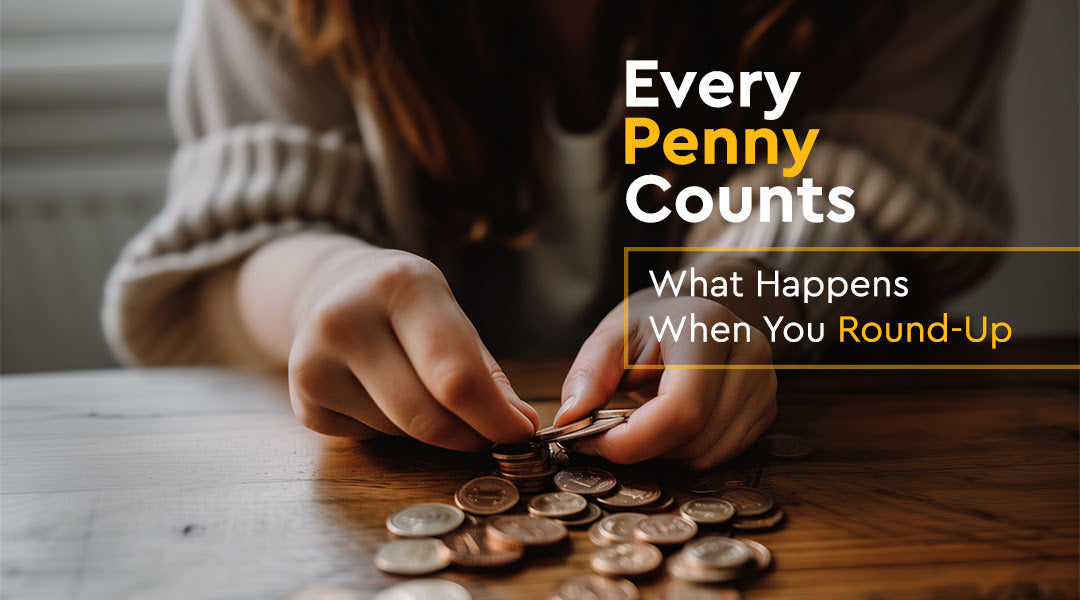
Every Penny Counts - What Happens When You Round-Up
“Every penny counts…”
Is this a phrase you’re familiar with?
Today we commonly purchase items online which necessitates the use of a credit/debit card, and even when paying in-person at a store/restaurant a debit/credit card is still a routine method of payment, so the notion of spare change seems to be rare nowadays.
But, this is a saying I was very acquainted with throughout my childhood and teenage years.
I heard this phrase a lot from my dad and grandpa, specifically as either one of them would empty their pockets, filled with loose change, into large mason jars or old tin coffee cans they stored on closet shelves or in kitchen cabinets.
As they’d transfer their pocket change to these vessels, I’d inevitably hear a common speech, one which told of the value of saving money, of giving to others, and overall, how we should never fail to recognize that these small amounts of money can add up rather quickly.
…and this is how they both used the phrase, “every penny counts.”
As a child, while I marveled at the sheer volume of loose coins my grandfather had saved, I don’t think I really grasped the vast potential of this practice until after he’d passed away.
After my grandpa’s funeral, as the family gathered in his home, sharing stories and memories, one of us mentioned his routine practice of picking up any coins he’d find in parking lots, to which he’d always say “every penny counts.”
Upon hearing our recollections regarding his practice, my grandma chimed in with, “you know he bought a brand new truck one time with the coins he saved over the years.”
WHAT?!?
Yes, my grandfather often picked up randomly dropped coins he’d find in the grocery store parking lot, but he also saved every coin he ever received as “change” from a transaction.
Coffee can after coffee can, mason jar after mason jar, he saved all of that loose change to the tune of thousands of dollars…and bought a brand new truck with it!
Of course, he also regularly donated to those in need in the community, to churches, to anyone in our family going through a rough patch, and on and on.
This one man gave, and he saved…and what an impact it made!
I know this is a small, simple, and personal story, but I shared this with you for one reason: if one man can save enough spare change over the years to contribute to charities and people he loved and believed in, while also paying for a new truck, can you even imagine what we could do as a society by donating our spare change to worthy causes?
Today, we’re going to explore the impact of rounding up, looking at what can happen when we collectively incorporate this practice and finally decide if every penny does indeed count.
What Happens When You Round Up

Have you ever been asked the following question while out dining or shopping - “Would you like to round up to the nearest dollar amount to support xxxx charity?”
It’s likely that nearly all of us have been asked this question either in person or online when completing a transaction, but what does it mean to round up in this manner?
Rounding up, or round up donations, typically take place as you check out at any given store, retailer, restaurant, or cafe.
And, in these instances, when asked to round up, typically your donation will be less than a dollar (though some retailers allow for larger donations).
For example, if your purchase total is $23.67, should you choose to round up when asked/prompted during checkout, your new total would be $24.00, meaning you’d be donating 33 cents to the company’s specified charity.
This method of charitable giving has become increasingly popular over the last 10-15 years as it grants access to a wider audience of individuals looking to donate to worthy causes.
Rounding up is also popular as individuals with practically any budget can contribute, with some donations being as little as one or two cents. (We’ll give you more details on the huge impact those few cents can have in a moment.)
Now, when I shared with you (above) concerning my grandfather, this illustrated the sheer volume of savings that could be compiled when a single person routinely ‘rounded up’ by keeping the remaining loose change from all cash transactions.
But, the practice of rounding up at retail locations compounds the impact of such actions by including an entire customer base in such endeavors.
Of course, contrary to my grandfather’s mission, when rounding up at a restaurant or retailer, the goal isn’t personal savings or donating to single churches or families in need. Instead, these individual companies pool the money graciously given by their customer base to support larger causes and charities.
Most of those locations (online or in person) which incorporate the practice of rounding up to support their chosen charity do so through Round Up America, “a nonprofit public benefit organization that provides the financial and legal compliance for for-profit businesses to collect donations for charities that are important to their culture, team members, and guests.”
And, it is estimated that more than half of consumers utilize such opportunities to donate to worthy causes simply by rounding up their transactions to the nearest dollar amount.
But, what kind of impact does this collective effort actually make?

Let’s take a look at this numerically to get a better picture of what truly happens when you round up…
- In 2022 alone, charities raised $749 million nationwide through rounding up, or what some refer to as point-of-sale donations. **And, this total only includes charitable campaigns which raised one million dollars or more.**
- Some examples include PetSmart which raised $44 million for animal welfare initiatives and Walmart/Sam’s Club which raised $28 million for Children’s Miracle Network Hospitals.
- For a bit of perspective regarding impact, take a look at these stats:
- Those businesses with approximately 5000 transactions daily, average annual round up donations of $220,000.
- Businesses averaging 50,000 transactions daily average annual donations (round up) of $2,200,000.
- And, those businesses averaging 200,000 transactions daily average annual donations of $8,800,000.
- While it is estimated that roughly 56% of consumers have opted to donate to charities by rounding up regularly, 72.1% of consumers have donated at least once using this method.
- 92% of consumers have a positive view of those companies which support charities.
- Those companies that seek to have positive impacts both socially and environmentally receive the most support from customers as 55% of consumers find such causes worthy of “extra” support.
Aside from the numbers, the simplicity and ease associated with this type of giving is said to attract new donors all the time, even those who may not have typically considered donating through traditional methods.
And, this same aspect of giving associated with rounding up has also been shown to prompt an even greater amount of generosity and care from individuals in other areas.
In other words, being able to contribute to worthy causes in such a simple way has been shown to inspire folks to seek out other means and methods of donating to causes they deem worthy in a more regular (and greater) manner.
Then, yet another benefit of rounding up is the sheer exposure some nonprofit organizations receive from such endeavors, where for-profit businesses can make customers aware of such efforts during these transactions.
But, why “rounding up?” Why not simply ask for donations in general?
And, do these prompts to round up, essentially collecting spare change for charity, have a greater impact than simply asking for donations of set amounts such as $1 or even 50 cents?
You would think that flat rate donations in the checkout line (online or in person) would yield greater givings, but according to those who’ve researched this matter, rounding up is truly more effective.
In one experiment, individuals with a transaction total of $23.01 were asked to donate one dollar to charity, and only 39.02% of consumers donated.
However, in the same experiment, individuals with a transaction total of $23.01 were asked to round up their total to $24 (as a donation to charity), and this time 63.41% gladly donated.
So, it seems there’s just something about asking folks to round up, versus requesting a firm amount for a donation, that prompts greater participation.
Others have observed the same phenomenon, as a similar experiment reviewed three options amongst consumers.

In this case, customers were asked the following:
- Would you like to donate 50 cents to charity?
- Would you like to round up your total of $23.50 to a total of $24 (for the purpose of charitable donation)?
- Would you like to round up your total of $23.50 to $24? And, this scenario included the retailer making a specific statement detailing that the consumer would be donating 50 cents.
The results (corresponding to the order listed above):
- When asked for a flat donation (50 cents), only 31.25% of participants donated.
- When simply asked to round up their total to the nearest dollar, 61.76% of participants donated.
- And, when asked to round up, also including the specifically noted amount of 50 cents, 72.72% of participants chose to donate.
One theory for the differences observed is that continual requests to consumers for donations can become burdensome, with some even describing the act of donating as painful.
And, I suppose I get it…when you’re giving $50 here and $100 there, $20 today and $30 tomorrow, these kinds of charitable endeavors can add up rather quickly when you’re already on a tight budget.
But, the request to round up smaller amounts (those which are under one dollar per donation), is a much more feasible one, especially when consumers realize they are working together with the masses, knowing that those little amounts add up to do great things.
Other than this theory, researchers and psychologists have yet to arrive at a conclusive reason for the differences seen here, so it must suffice to say that no matter the reason, rounding up (both vague and specific prompts) yield greater donations than requests for flat amounts.
Another fun fact, researchers have also noted that they expected to see a greater amount of people donating when only rounding up a few cents as opposed to the 99 cent donation requested in the first scenario above, but there doesn’t seem to be a distinction in amount, only the fact that asking someone to round up yields greater success than other methods.
I think we can all agree from the examples and stats above that when we collectively make even the smallest of contributions, big things can happen!
Make It Count

I’m not sure if this qualifies as an elephant in the room, but upon reading everything we’ve detailed here today, many of you may have arrived at a common question or thought surrounding the act of rounding up…
“I’m asked if I’d like to round up for nearly all online transactions as well as most in-person encounters, but I can’t donate each and every time.”
“Should I just randomly choose to round up?” “When should I round up and when should I refrain?”
“How do I know where my contributions are going?”
Right now many are struggling to make ends meet, so the saying “every penny counts” can often be used regarding personal finances.
And, if you’re in that number, rounding up for purchases may be a selective activity.
But, in reality, all such donations should be selective, no matter your financial situation.
What we’ve seen today is the profound impact even a few pennies can make when we all band together to support a worthy cause.
So, let those last few words of the above sentence be what drives you in your decision to donate - a worthy cause.
One of our four core pillars here at Lifeboost is CAUSE.
We chose this word because we think it’s abundantly important to support causes we believe in.
At Lifeboost, we support the Rainforest Trust because we believe it’s important to protect these precious habitats and the plant and animal life which rely on these areas.
We use EcoCart to compound our efforts (those efforts including sustainable growing practices to protect our planet and produce clean, healthy coffee) in reducing carbon emissions.
We have adopted endangered animals in an effort to protect and raise awareness concerning endangered wildlife.
We have partnered with and donated to Project Alianza, a program which builds schools in the regions where our coffee farmers raise their families.
We support charities in Africa which provide clean water, help women entrepreneurs run their own businesses, provide school lunches to children, help victims of human trafficking, and much more.
We donate coffee to our local first responders, police, fire, EMS workers, teachers, nurses, and more.
We do all of this because these are areas we’re passionate about, these are people, places, services, and causes we believe to be worthy of our support.
And, when revisiting those “elephant in the room” types of questions, it really is as simple as that.

So, when deciding if and when to round up…
Examine yourself, and take note of those things you’re passionate about. Maybe it’s the environment or underprivileged and impoverished countries or communities. Maybe it’s children or survivors of abuse, even veterans, community servants, etc.
Then, once you know where your heart is on these issues, search for businesses or retailers which support those charities which align with your personal convictions and passions.
Studies show the most effective rounding up campaigns are those which are fully transparent with customers, letting them know exactly where their contributions will be going.
Generally this is the standard, but if you’ve been asked to round up at a location that isn’t clear on this information, simply ask a manager, then donate accordingly.
And, as we’ve seen here today, always remember, you may think your rounded up spare change isn’t much, but together our (collective) pennies (or more) can make a huge difference!
Check out Lifeboost Coffee Grata Medium Roast.

Becky is a mother, educator, and content writer for Lifeboost Coffee. She has had three years’ experience as a writer, and in that time she has enjoyed creatively composing articles and ebooks covering the topics of coffee, health and fitness, education, recipes, and relationships.
- https://www.npr.org/2024/03/10/1236458377/charity-roundup-donations-stores-fundraising
- https://www.michigandaily.com/opinion/should-you-round-up-for-charity/#
- https://www.transparenthands.org/round-up-donations-for-charity-process-and-societal-impact/
- https://www.rounditupamerica.org/mission-partners/
- https://myscp.onlinelibrary.wiley.com/doi/abs/10.1002/jcpy.1064
- https://news.ncsu.edu/2018/09/rounding-up-fundraisers/#
- https://www.marketplace.org/2022/03/28/more-businesses-are-asking-us-to-round-up-for-charity-how-much-change-does-it-take-to-make-change/
- References for the article to confirm data and information.
Drop a Comment
Really like your coffee put it has become cost prohibited especially since it takes 2 scoops per cup to get a good taste.










